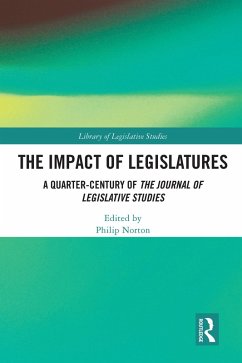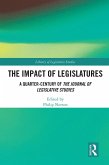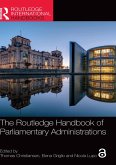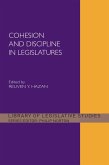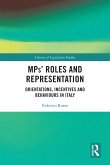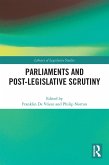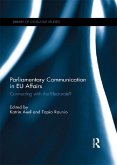The Impact of Legislatures (eBook, PDF)
A Quarter-Century of The Journal of Legislative Studies
Redaktion: Norton, Philip
43,95 €
43,95 €
inkl. MwSt.
Sofort per Download lieferbar

22 °P sammeln
43,95 €
Als Download kaufen

43,95 €
inkl. MwSt.
Sofort per Download lieferbar

22 °P sammeln
Jetzt verschenken
Alle Infos zum eBook verschenken
43,95 €
inkl. MwSt.
Sofort per Download lieferbar
Alle Infos zum eBook verschenken

22 °P sammeln
The Impact of Legislatures (eBook, PDF)
A Quarter-Century of The Journal of Legislative Studies
Redaktion: Norton, Philip
- Format: PDF
- Merkliste
- Auf die Merkliste
- Bewerten Bewerten
- Teilen
- Produkt teilen
- Produkterinnerung
- Produkterinnerung

Bitte loggen Sie sich zunächst in Ihr Kundenkonto ein oder registrieren Sie sich bei
bücher.de, um das eBook-Abo tolino select nutzen zu können.
Hier können Sie sich einloggen
Hier können Sie sich einloggen
Sie sind bereits eingeloggt. Klicken Sie auf 2. tolino select Abo, um fortzufahren.

Bitte loggen Sie sich zunächst in Ihr Kundenkonto ein oder registrieren Sie sich bei bücher.de, um das eBook-Abo tolino select nutzen zu können.
The Impact of Legislature brings together key articles and path-breaking scholarship published in The Journal of Legislative Studies during its first 25 years of publication, enabling the reader to make sense of the impact of the legislature in the modern world.
- Geräte: PC
- mit Kopierschutz
- eBook Hilfe
Andere Kunden interessierten sich auch für
![The Roles and Function of Parliamentary Questions (eBook, PDF) The Roles and Function of Parliamentary Questions (eBook, PDF)]() The Roles and Function of Parliamentary Questions (eBook, PDF)45,95 €
The Roles and Function of Parliamentary Questions (eBook, PDF)45,95 €![The Impact of Legislatures (eBook, ePUB) The Impact of Legislatures (eBook, ePUB)]() The Impact of Legislatures (eBook, ePUB)43,95 €
The Impact of Legislatures (eBook, ePUB)43,95 €![The Routledge Handbook of Parliamentary Administrations (eBook, PDF) The Routledge Handbook of Parliamentary Administrations (eBook, PDF)]() The Routledge Handbook of Parliamentary Administrations (eBook, PDF)45,95 €
The Routledge Handbook of Parliamentary Administrations (eBook, PDF)45,95 €![Cohesion and Discipline in Legislatures (eBook, PDF) Cohesion and Discipline in Legislatures (eBook, PDF)]() Cohesion and Discipline in Legislatures (eBook, PDF)45,95 €
Cohesion and Discipline in Legislatures (eBook, PDF)45,95 €![MPs' Roles and Representation (eBook, PDF) MPs' Roles and Representation (eBook, PDF)]() Federico RussoMPs' Roles and Representation (eBook, PDF)43,95 €
Federico RussoMPs' Roles and Representation (eBook, PDF)43,95 €![Parliaments and Post-Legislative Scrutiny (eBook, PDF) Parliaments and Post-Legislative Scrutiny (eBook, PDF)]() Parliaments and Post-Legislative Scrutiny (eBook, PDF)43,95 €
Parliaments and Post-Legislative Scrutiny (eBook, PDF)43,95 €![Parliamentary Communication in EU Affairs (eBook, PDF) Parliamentary Communication in EU Affairs (eBook, PDF)]() Parliamentary Communication in EU Affairs (eBook, PDF)41,95 €
Parliamentary Communication in EU Affairs (eBook, PDF)41,95 €-
-
-
The Impact of Legislature brings together key articles and path-breaking scholarship published in The Journal of Legislative Studies during its first 25 years of publication, enabling the reader to make sense of the impact of the legislature in the modern world.
Dieser Download kann aus rechtlichen Gründen nur mit Rechnungsadresse in A, B, BG, CY, CZ, D, DK, EW, E, FIN, F, GR, HR, H, IRL, I, LT, L, LR, M, NL, PL, P, R, S, SLO, SK ausgeliefert werden.
Produktdetails
- Produktdetails
- Verlag: Taylor & Francis
- Seitenzahl: 518
- Erscheinungstermin: 10. September 2020
- Englisch
- ISBN-13: 9781000095821
- Artikelnr.: 60092308
- Verlag: Taylor & Francis
- Seitenzahl: 518
- Erscheinungstermin: 10. September 2020
- Englisch
- ISBN-13: 9781000095821
- Artikelnr.: 60092308
- Herstellerkennzeichnung Die Herstellerinformationen sind derzeit nicht verfügbar.
Philip Norton (Lord Norton of Louth) is Professor of Government and Director of the Centre for Legislative Studies at the University of Hull, UK, and is a member of the UK House of Lords. He is the Founding Editor of The Journal of Legislative Studies.
Introduction
Philip Norton
DEVELOPING THEORY
1. Rational Choice Theory in Legislative Studies: Models of Politics without Romanticism
Thomas Saalfeld
2. Conditional Agenda-Setting and Decision-Making Inside the European Parliament
George Tsebelis
COMPARING LEGISLATURES
3. Introduction: Comparing the Legislative Performance of Legislatures
David Arter
4. Social Choice and Comparing Legislatures: Constitutional Versus Institutional Constraints
Anthony J. McGann
5. Rethinking Bicameral Strength: A Three-Dimensional Approach
Meg Russell
6. Conclusion: Questioning the "Mezey Question": An Interrogatory Framework for the Comparative Study of Legislators
David Arter
PARTY, DIVISION AND CONSENSUS
7. Party Unity in Parliamentary Democracies: A Comparative Analysis
Ulrich Sieberer
8. Parliamentary Consociationalism in Lebanon: Equal Citizenry v. Quotated Confessionalism
Imad Salamey and Rhys Payne
9. Parliamentary Opposition in Westminster Democracies: Britain, Canada, Australia and New Zealand
Andre Kaiser
10. Differences and Changes in Danish Party Organisations: Central Party Organisation Versus Parliamentary Party Group Power
Helene Helboe Pedersen
REPRESENTATION
11. Ethnic Group Representation in Cross-National Comparison
Didier Ruedin
12. Women's Substantive Representation: Defending Feminist Interests or Women's Electoral Preferences?
Anouk Lloren
13. State Based Representation and National Policymaking: The Evolution of the Australian Senate and the Federation
Scott Brenton
14. "A More Representative Chamber": Representation and the House of Lords
Hugh Bochel and Andrew Defty
INFLUENCE OF MEMBERS
15. Assessing the Influence of Select Committees in the UK: The Education and Skills Committee, 1997-2005
Andrew Hindmoor, Phil Larkin and Andrew Kennon
16. Exploring the Role of "Legislators" in Canada: Do Members of Parliament Influence Policy?
Kelly Blidook
17. Parliament and the Poll Tax: A Case Study in Parliamentary Pressure
Philip Cowley
PARLIAMENTS AND CITIZENS
18. Studying the Relationship between Parliaments and Citizens
Cristina Leston-Bandeira
19. How are Parliaments Using New Media to Engage with Citizens?
Jeffrey Griffith and Cristina Leston-Bandeira
20. Parliaments and Citizens in the United Kingdom
Philip Norton
21. Microblogging, Constituency Service and Impression Management: UK MPs and the Use of Twitter
Nigel Jackson and Darren Lilleker
PARLIAMENTARY QUESTIONS
22 Parliamentary Questions: The Behaviour of Legislators, and the Function of Legislatures: An Introduction
Shane Martin
23. Questioning Parliamentary Questions
Olivier Rozenberg and Shane Martin
24. Parliamentary Questions in 17 European Parliaments: Some Steps Towards Comparison
Frederico Russo and Matti Wiberg
25. Parliamentary Questions as Instruments of Substantive Representation: Visible Minorities in the UK House of Commons, 2005-2010
Thomas Saalfeld
Philip Norton
DEVELOPING THEORY
1. Rational Choice Theory in Legislative Studies: Models of Politics without Romanticism
Thomas Saalfeld
2. Conditional Agenda-Setting and Decision-Making Inside the European Parliament
George Tsebelis
COMPARING LEGISLATURES
3. Introduction: Comparing the Legislative Performance of Legislatures
David Arter
4. Social Choice and Comparing Legislatures: Constitutional Versus Institutional Constraints
Anthony J. McGann
5. Rethinking Bicameral Strength: A Three-Dimensional Approach
Meg Russell
6. Conclusion: Questioning the "Mezey Question": An Interrogatory Framework for the Comparative Study of Legislators
David Arter
PARTY, DIVISION AND CONSENSUS
7. Party Unity in Parliamentary Democracies: A Comparative Analysis
Ulrich Sieberer
8. Parliamentary Consociationalism in Lebanon: Equal Citizenry v. Quotated Confessionalism
Imad Salamey and Rhys Payne
9. Parliamentary Opposition in Westminster Democracies: Britain, Canada, Australia and New Zealand
Andre Kaiser
10. Differences and Changes in Danish Party Organisations: Central Party Organisation Versus Parliamentary Party Group Power
Helene Helboe Pedersen
REPRESENTATION
11. Ethnic Group Representation in Cross-National Comparison
Didier Ruedin
12. Women's Substantive Representation: Defending Feminist Interests or Women's Electoral Preferences?
Anouk Lloren
13. State Based Representation and National Policymaking: The Evolution of the Australian Senate and the Federation
Scott Brenton
14. "A More Representative Chamber": Representation and the House of Lords
Hugh Bochel and Andrew Defty
INFLUENCE OF MEMBERS
15. Assessing the Influence of Select Committees in the UK: The Education and Skills Committee, 1997-2005
Andrew Hindmoor, Phil Larkin and Andrew Kennon
16. Exploring the Role of "Legislators" in Canada: Do Members of Parliament Influence Policy?
Kelly Blidook
17. Parliament and the Poll Tax: A Case Study in Parliamentary Pressure
Philip Cowley
PARLIAMENTS AND CITIZENS
18. Studying the Relationship between Parliaments and Citizens
Cristina Leston-Bandeira
19. How are Parliaments Using New Media to Engage with Citizens?
Jeffrey Griffith and Cristina Leston-Bandeira
20. Parliaments and Citizens in the United Kingdom
Philip Norton
21. Microblogging, Constituency Service and Impression Management: UK MPs and the Use of Twitter
Nigel Jackson and Darren Lilleker
PARLIAMENTARY QUESTIONS
22 Parliamentary Questions: The Behaviour of Legislators, and the Function of Legislatures: An Introduction
Shane Martin
23. Questioning Parliamentary Questions
Olivier Rozenberg and Shane Martin
24. Parliamentary Questions in 17 European Parliaments: Some Steps Towards Comparison
Frederico Russo and Matti Wiberg
25. Parliamentary Questions as Instruments of Substantive Representation: Visible Minorities in the UK House of Commons, 2005-2010
Thomas Saalfeld
Introduction
Philip Norton
DEVELOPING THEORY
1. Rational Choice Theory in Legislative Studies: Models of Politics without Romanticism
Thomas Saalfeld
2. Conditional Agenda-Setting and Decision-Making Inside the European Parliament
George Tsebelis
COMPARING LEGISLATURES
3. Introduction: Comparing the Legislative Performance of Legislatures
David Arter
4. Social Choice and Comparing Legislatures: Constitutional Versus Institutional Constraints
Anthony J. McGann
5. Rethinking Bicameral Strength: A Three-Dimensional Approach
Meg Russell
6. Conclusion: Questioning the "Mezey Question": An Interrogatory Framework for the Comparative Study of Legislators
David Arter
PARTY, DIVISION AND CONSENSUS
7. Party Unity in Parliamentary Democracies: A Comparative Analysis
Ulrich Sieberer
8. Parliamentary Consociationalism in Lebanon: Equal Citizenry v. Quotated Confessionalism
Imad Salamey and Rhys Payne
9. Parliamentary Opposition in Westminster Democracies: Britain, Canada, Australia and New Zealand
Andre Kaiser
10. Differences and Changes in Danish Party Organisations: Central Party Organisation Versus Parliamentary Party Group Power
Helene Helboe Pedersen
REPRESENTATION
11. Ethnic Group Representation in Cross-National Comparison
Didier Ruedin
12. Women's Substantive Representation: Defending Feminist Interests or Women's Electoral Preferences?
Anouk Lloren
13. State Based Representation and National Policymaking: The Evolution of the Australian Senate and the Federation
Scott Brenton
14. "A More Representative Chamber": Representation and the House of Lords
Hugh Bochel and Andrew Defty
INFLUENCE OF MEMBERS
15. Assessing the Influence of Select Committees in the UK: The Education and Skills Committee, 1997-2005
Andrew Hindmoor, Phil Larkin and Andrew Kennon
16. Exploring the Role of "Legislators" in Canada: Do Members of Parliament Influence Policy?
Kelly Blidook
17. Parliament and the Poll Tax: A Case Study in Parliamentary Pressure
Philip Cowley
PARLIAMENTS AND CITIZENS
18. Studying the Relationship between Parliaments and Citizens
Cristina Leston-Bandeira
19. How are Parliaments Using New Media to Engage with Citizens?
Jeffrey Griffith and Cristina Leston-Bandeira
20. Parliaments and Citizens in the United Kingdom
Philip Norton
21. Microblogging, Constituency Service and Impression Management: UK MPs and the Use of Twitter
Nigel Jackson and Darren Lilleker
PARLIAMENTARY QUESTIONS
22 Parliamentary Questions: The Behaviour of Legislators, and the Function of Legislatures: An Introduction
Shane Martin
23. Questioning Parliamentary Questions
Olivier Rozenberg and Shane Martin
24. Parliamentary Questions in 17 European Parliaments: Some Steps Towards Comparison
Frederico Russo and Matti Wiberg
25. Parliamentary Questions as Instruments of Substantive Representation: Visible Minorities in the UK House of Commons, 2005-2010
Thomas Saalfeld
Philip Norton
DEVELOPING THEORY
1. Rational Choice Theory in Legislative Studies: Models of Politics without Romanticism
Thomas Saalfeld
2. Conditional Agenda-Setting and Decision-Making Inside the European Parliament
George Tsebelis
COMPARING LEGISLATURES
3. Introduction: Comparing the Legislative Performance of Legislatures
David Arter
4. Social Choice and Comparing Legislatures: Constitutional Versus Institutional Constraints
Anthony J. McGann
5. Rethinking Bicameral Strength: A Three-Dimensional Approach
Meg Russell
6. Conclusion: Questioning the "Mezey Question": An Interrogatory Framework for the Comparative Study of Legislators
David Arter
PARTY, DIVISION AND CONSENSUS
7. Party Unity in Parliamentary Democracies: A Comparative Analysis
Ulrich Sieberer
8. Parliamentary Consociationalism in Lebanon: Equal Citizenry v. Quotated Confessionalism
Imad Salamey and Rhys Payne
9. Parliamentary Opposition in Westminster Democracies: Britain, Canada, Australia and New Zealand
Andre Kaiser
10. Differences and Changes in Danish Party Organisations: Central Party Organisation Versus Parliamentary Party Group Power
Helene Helboe Pedersen
REPRESENTATION
11. Ethnic Group Representation in Cross-National Comparison
Didier Ruedin
12. Women's Substantive Representation: Defending Feminist Interests or Women's Electoral Preferences?
Anouk Lloren
13. State Based Representation and National Policymaking: The Evolution of the Australian Senate and the Federation
Scott Brenton
14. "A More Representative Chamber": Representation and the House of Lords
Hugh Bochel and Andrew Defty
INFLUENCE OF MEMBERS
15. Assessing the Influence of Select Committees in the UK: The Education and Skills Committee, 1997-2005
Andrew Hindmoor, Phil Larkin and Andrew Kennon
16. Exploring the Role of "Legislators" in Canada: Do Members of Parliament Influence Policy?
Kelly Blidook
17. Parliament and the Poll Tax: A Case Study in Parliamentary Pressure
Philip Cowley
PARLIAMENTS AND CITIZENS
18. Studying the Relationship between Parliaments and Citizens
Cristina Leston-Bandeira
19. How are Parliaments Using New Media to Engage with Citizens?
Jeffrey Griffith and Cristina Leston-Bandeira
20. Parliaments and Citizens in the United Kingdom
Philip Norton
21. Microblogging, Constituency Service and Impression Management: UK MPs and the Use of Twitter
Nigel Jackson and Darren Lilleker
PARLIAMENTARY QUESTIONS
22 Parliamentary Questions: The Behaviour of Legislators, and the Function of Legislatures: An Introduction
Shane Martin
23. Questioning Parliamentary Questions
Olivier Rozenberg and Shane Martin
24. Parliamentary Questions in 17 European Parliaments: Some Steps Towards Comparison
Frederico Russo and Matti Wiberg
25. Parliamentary Questions as Instruments of Substantive Representation: Visible Minorities in the UK House of Commons, 2005-2010
Thomas Saalfeld
